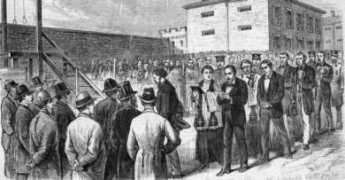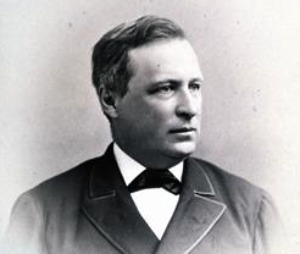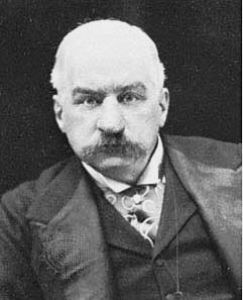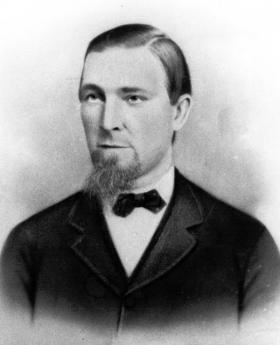Related Topics
Outlaws: Crime in Philadelphia
Even the criminals, the courts and the prisons of this town have a Philadelphia distinctiveness. The underworld has its own version of history.
Railroad Town
 It's generally agreed, railroads failed to adjust their fixed capacity to changing demands. It's less certain Philadelphia was pulled down by that collapsing rail system.
It's generally agreed, railroads failed to adjust their fixed capacity to changing demands. It's less certain Philadelphia was pulled down by that collapsing rail system.
Customs, Culture and Traditions (2)
.
Central Pennsylvania
"Alabama in-between," snickered James Carville, "Philadelphia, Pittsburgh, and Alabama in-between."
Molly Maguires of Pennsylvania (2)

|
| the Mollie threat in the coal regions |
IT was in their interest for both the Molly Maguires and their chief enemies to exaggerate the Mollie threat in the coal regions. Mollies hoped to achieve more pay for less work by intimidating employers, the more intimidation the better. The management of the mines and railroads more shrewdly hoped to mobilize public sympathy to their side, in the newspapers, courts, and legislature, by exaggerating the undoubtedly real menace of lawless, unpatriotic behavior. There have since been great strides in the art of slanted propaganda, and it takes more finesse to mobilize modern opinion. Having watched Hitler and Stalin in action, and noticing our political parties going in the same direction, we would now regard the behavior of 1870 to be crude, and therefore less effective. But there was one very public rebuttal to what the Mollies were claiming. Although they portrayed themselves as oppressed Irish in an English dominated world, their main enemy was himself a well known Irishman.

|
| Franklin Benjamin Gowen |
Franklin Benjamin Gowen, President of the Reading Railroad from 1870-1886, was both Irish and definitely larger than life. As one illustration of his extraordinary energy, he died at the age of 53 but had risen from moderate circumstances to control what would become the largest railroad in America by age 34, ultimately being forced from office by J.P. Morgan while still only 50. By some measures, in those sixteen years, he had made the Reading into the largest corporation in the world, even though he had comparatively little interest in and no training in railroading. Although born in Mt. Airy, he apprenticed himself to a lawyer in Pottsville, and at age 26 became District Attorney in the coal region during the first outbursts of Molly Maguire violence. Although he had never gone to law school, he seemed to love the courtroom and continued to work as an independent trial lawyer all during the time he was president of the railroad. One commentator remarked that to read his speeches in cold type was still enough to jeopardize one's judgment. During his later battles for corporate dominance, he twice filled the Academy of Music with stockholders, holding them spellbound for three-hour speeches. On this evidence alone, one. supposes he had a lifelong tendency to stretch facts.

|
| J.P. Morgan |
Following the Civil War, labor relations in this rough coal region became temporarily peaceful. The prosperity of a post-war boom was probably mainly responsible, but it was also true that the labor movement was pretty well smashed by the response to patriotic feelings, slavery was no longer an issue, and huge casualties in the war had created labor shortages. However, these same factors made dominance of the coal and railroad industries more attractive. Franklin Gowen set about merging the small railroads in the coal region into an empire, and used his control of freight costs to force the coal distributors and the coal producers into subservience or forced sales. The charter of the Reading Railroad inconveniently prohibited the railroad from owing mines, but other competitors were legally permitted to do so. Using the fairness argument and probably both bribery and threats, he "persuaded" the legislature to permit a new corporation to own mines, and permitted railroads to own the new corporation. The Reading then promptly owned the mines in a two-step arrangement, couched in bewildering legal language. Gowen had no compunction about doubling freight rates and then doubling them again until he got what he wanted. Anthracite coal was the driving engine of America's Industrial Revolution, and Gowen controlled it. He was a wild and reckless spender, he thought big, and was ready to smash any opposition. His ambition set him to building a transcontinental trunk line which would compete with the Pennsylvania and New York Central lines, both under the control of J. P. Morgan or his allies. This venture failed and became the basis for the present Pennsylvania Turnpike . Ultimately, Gowen's ambitions were thwarted by his reckless spending putting him at the mercy of English bankers, allied to the Morgan interests. Underlying this was an economic fact: Henry Frick had found a way to make bituminous coal into coke, which was a cheaper fuel for steel making than anthracite. Financed by Morgan and organized by Andrew Carnegie, the steel industry moved to Pittsburgh.

|
| John Sidney, founder WBA |
Meanwhile, what happened to the Molly Maguires? The financial panic of 1873, started by the collapse of Jay Cooke's financial company, precipitated layoffs and cost-cutting and stimulated a new rise of labor unrest. The Mollies shot some mine managers, but most of the labor organized under a fairly moderate union called the Workingmen's Benevolent Association. More moderate or not, they still threatened strikes and demanded concessions, and Gowen set about to wipe them out. As headstrong and impulsive as he was it's even possible he believed the Molly Maguire movement was stronger than it really was. But it would not have mattered. The Pinkerton agency was hired, detailed studies were prepared of the nature and leadership of the Molly movement, evidence of wrong-doing was collected, and some of the right people were hanged. Once more, the labor movement was crushed, largely by characterizing all labor unions as lengthened shadows of the Molly Maguires. And labor has never forgotten or forgiven. Even a century later, any sort of labor ruthlessness especially in Congress, is proclaimed justified since any capitalist, or even any Republican, is a covert Franklin B. Gowen. And quite possibly either English or protestant, as well, even though Gowen happened to be as Irish as any of the Mollies.
It's a great pity that seemingly the last opportunity for national adoption of the Whig philosophy of upward social mobility was exiled from American political discourse. Everybody is better off with peace, law and order; given time, our political system does offer everyone at the bottom of the heap a fair opportunity to rise to the top. After a couple of centuries, it thus ought to be obvious that class warfare hurts everyone, helps no one. But at election time, both parties feel compelled to characterize each other as either a Franklin Gowen, or a Molly Maguire.
As a footnote, Frank Gowen died from a gunshot in Washington DC in 1889. An extensive investigation was conducted, and there is almost complete certainty that no Molly Maguire was responsible. But the bullet came from a strange angle, there was no suicide note, and it remains possible that someone else, not suicide, was responsible. Gowen had plenty of other enemies.
Originally published: Tuesday, August 18, 2009; most-recently modified: Friday, May 24, 2019